AFRICA RISING
Realising Africa’s Potential as a Global Publishing Leader in the 21st Century
International Publishers
Association Nairobi Seminar
14th - 15th June 2019
Hosted in Nairobi, Kenya

REVIEW
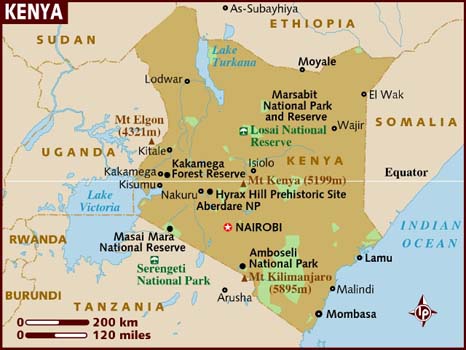
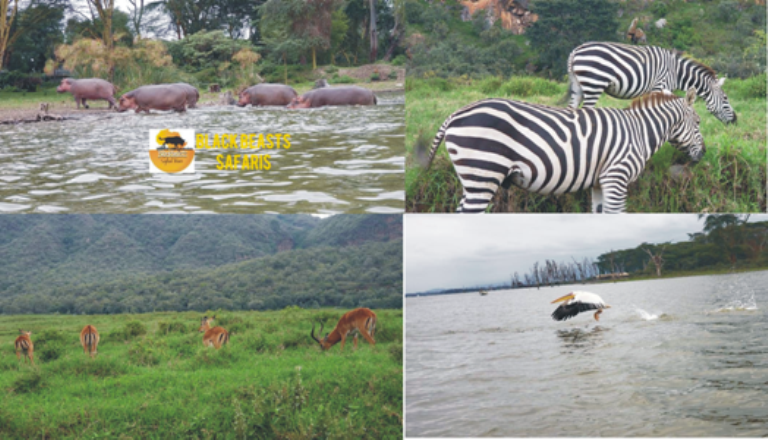
On the 9th June – the Day of Pentecost – my heart alight with hope for Africa - I boarded flight ET 900. Seatbelt fastened, eyes closed in prayer for journey mercies, I let Ethiopian Airways fly me out of Lagos, Nigeria, over the forests, mountains and rivers of Chad, Sudan’s plains and Red Sea Hills, bound for Ethiopia, Addis Ababa. At Bole Airport, ET 308 would fly me to Nairobi. We landed safely in Jomo Kenyatta Airport at around 1.30am on 10th June 2019. Visa processing at Immigration at that spectral hour was a quick, silent affair. In no time I was walking out of the airport building into a cold Kenyan night. A taxi driver- a massive, dark skinned Kenyan dressed up for a Nordic winter shepherded me into the car-park, looking at me with concern when he saw that I was chilly; talking about Kenyan winters, nodding towards the ATM, asking whether I had Kenyan Shillings on me. It was far too dark outside to see anything during the long drive to the Mӧvenpick Hotel in Westlands, Nairobi, where he deposited me and my suitcase with a courtesy that did nothing to hide the fact that he had overcharged me.
MÓ§venpick staff were professional. I had forgotten just how much Kenya is a
veteran of world class hospitality. I had expected a generic, 5 star hotel with
standardised facilities. What welcomed me was the eclectic luxury of a spacious
lobby. A selection of gleaming
sculptures dotted a setting which I would find relaxing as the meeting days
unfolded. The kind of setting that provides the comfortable nooks I would need
for two interviews. The first was with Elliot Agyare, President of the Ghana
Publishers Association and of the Commonwealth Book Publishers Association - http://bordersliteratureonline.net/globaldetail/Elliot-Agyare. The
other was with Gill Moodie, Commissioning Editor at NB Publishers, home of The
President’s Keepers, the runaway bestseller by Jacques Pauw about
beleaguered Jacob Zuma. NB Publishers is South Africa’s biggest trade
publisher. All checked-in and into the elevator bearing me to the 8th floor
where my room and sleep awaited me. It was now about 3 in the morning. I was
relieved to be feeling tired again and noticed too that a gentle peace was
rising in me. A good sign. And true. The IPA Nairobi seminar of June 14th
– June 15th, would be a rewarding meeting of experts brought
together to discuss how to position Africa as a global publishing leader – that will take a while and quite a journey - and themed Africa
Rising.

JUNE 13TH 2019 - PRE-CONFERENCE EVENTS
The birthing of any good thing is magical: the first IPA Seminar, Publishing for Sustainable Development: The Role of Publishers in Africa took place on May 9th 2018, here in Lagos, Nigeria. On the sidelines of this second edition in Nairobi would be a new IPA initiative, Africa in Action: two MOU signings slated for Thursday 13th June: one between the IPA and APNet (African Publishers Network) and the other between IPA and ADEA (Association for the Development of Education in Africa). Africa in Action has been designed to ensure collective management of plans and their materialisation.

Same day, early evening, UAE’s Bodour Al Qasimi,
Vice-President of the IPA, would host the second edition of the innovative PublisHers
Dinner which she initiated at the London Book Fair in March 2019. Conceived
to take place as a supplement to major IPA conferences, it is a lavish, all-woman,
invitation only party that gathers leading women in the publishing eco-system around
the dinner table. They are expected to discuss critical issues in the industry
and of course, to network. Invited as a media practitioner, I attended the
Nairobi edition of the PublisHers Dinner.
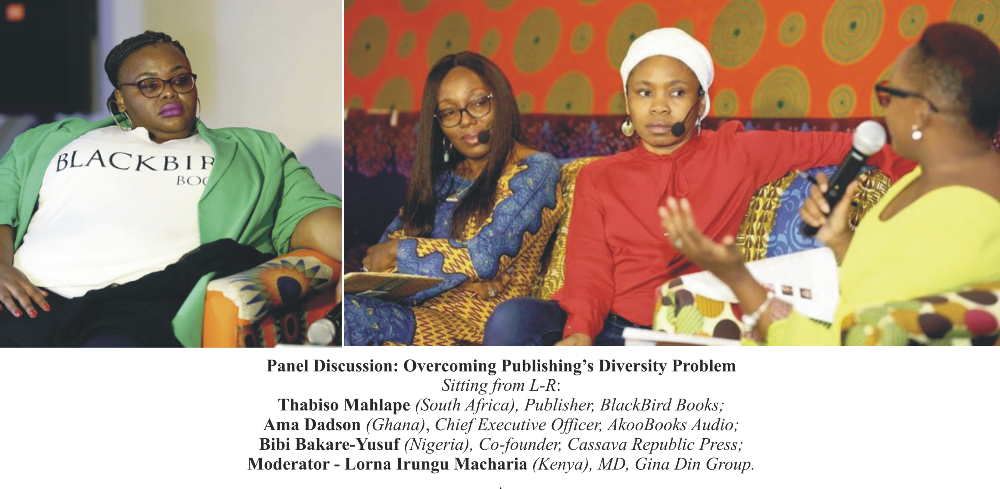
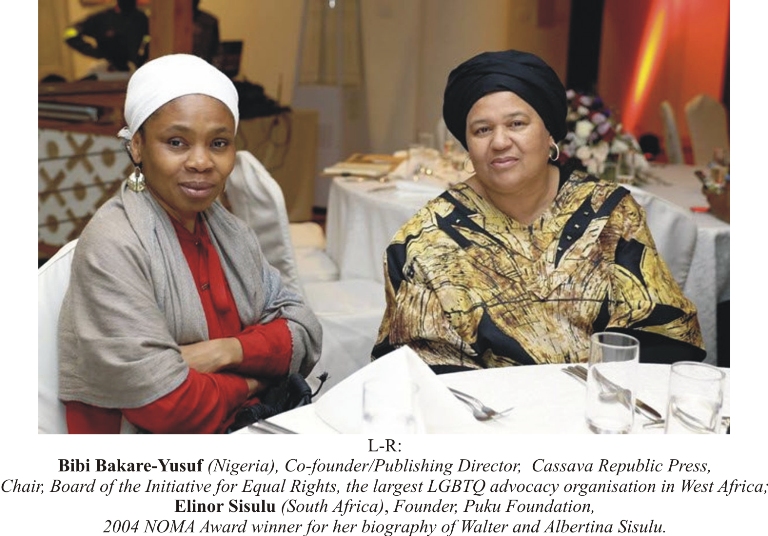
It was an elegant evening held on a terrace of the
MÓ§venpick Hotel. The spotlight was on three leading lights of African
Publishing: Bibi Bakare-Yusuf of Cassava
Republic Press, Nigeria; Thabiso Mahlape of Blackbird Books, South Africa (An
Imprint of Jacana Media) and Ama Dadson of Akoo Books (audio books), Ghana. The
women talked with moderator Lorna Irungu Macharia of Gina Din Group, Kenya, about
their rise to power in a male dominated arena that has up until now resisted
diversity. I am always struck by Bibi Bakare’s spirited commentary peppered
with insights and surprising takes on any issue. On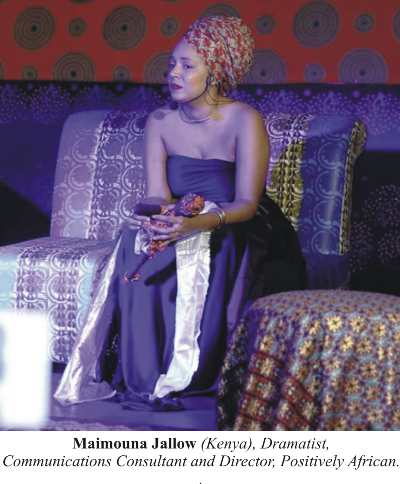 the PublisHers panel, she
didn’t disappoint, describing hijab clad staff as a must-have in Cassava
Republic’s editorial team working in Christian dominated corporate Nigeria. Responding
to Ama Dadson’s subtle navigations around male dominated meetings, she
recommended processing information quickly as the men speak - not later- and
speaking up so you don’t get pushed out of the conversation.
the PublisHers panel, she
didn’t disappoint, describing hijab clad staff as a must-have in Cassava
Republic’s editorial team working in Christian dominated corporate Nigeria. Responding
to Ama Dadson’s subtle navigations around male dominated meetings, she
recommended processing information quickly as the men speak - not later- and
speaking up so you don’t get pushed out of the conversation.
After the panel, no-one complained when critical issues in publishing were neglected in favour of refills of champagne, good food, networking and above all, Maimouna Jallow, Kenyan dramatist of women’s literary works who held us captive with her performance of Lola Shoneyin’s The Secret Lives of Baba Segi’s Wives.

THE VALUE OF PUBLISHING CONFERENCES - DEBATE RAGES
Let’s take a quick look at the major international conferences on the African book industry that have taken place between November 2017 and June 2019 – within less than 24 months. They are too big to ignore:
In the Book Publishing in Africa hub on Facebook, news of the Continental Framework for National Book & Reading Policies was relayed with jubilation by believers, David Waweru of World Alive Publishers (Kenya) and ADEA’s Lily Nyariki, who is also Librarian in charge of the Moi University bookshops. The news was received with the expected scorn by industry’s cynics in what is the longest, most impassioned and knowledgeable conversation I have witnessed on social media. The debate closed (at least for now) with David Waweru warning sceptics that if old Africa hands continue to look in the rear-view mirror [of past paralysis] as we try to move the industry forward, we will crash. Quite true. It is also true that Waweru’s caution is unlikely to make a difference to the jaded views of some of these (prominent) members of the African publishing community. They will continue to dismiss meetings conceived to identify and meet the challenges besetting African publishing, as ‘talk shops’.
FROM TALK TO ACTION
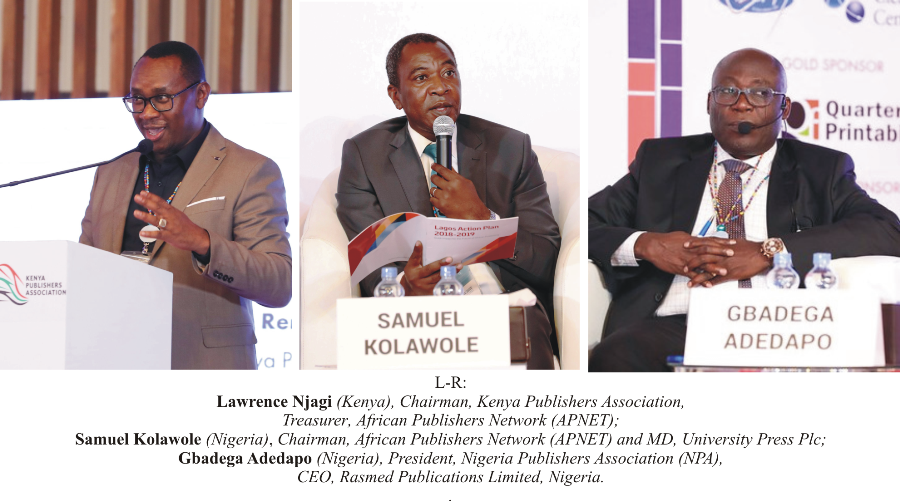
Continental breakfast stations were set up in a
corner of a broad outdoor lobby area flanked on both sides by publishers’
booths. This exhibition area was the gateway to the great Hall of Africa where
the IPA Nairobi seminar would unfold from 8am on Friday 14th June
with an estimated attendance of over 300 guests: publishers and stakeholders of
the wider industry. With Kenyan Pete Openda as Master of Ceremony, over the
course of 11 panels the African book industry would evaluate and express
frustration about its challenges. I
wasted no time in scheduling a post-conference interview on Borders - my online
publicity service - with Gbadega Adedapo, President of the Nigerian Publishers
Association who would present the Lagos Action Plan, this plan of plans,
generated by the 1st IPA African Seminar held in Lagos, Nigeria, May
2018.
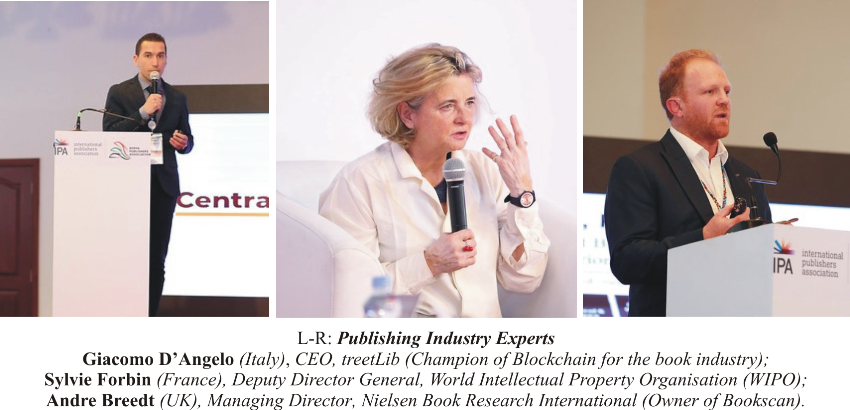
I must point out that none of the conference sceptics
were present at the Nairobi meeting to witness the commitment of the IPA and the
African Publishers Network to the newly launched IPA African Seminar Series. I
was there and to me the emphasis organisers had placed on seminar specific action
plans and near-term impact signalled a credible new dawn for the industry. I noted tangible solutions to clearly
articulated problems rather than boring theory in the presentations delivered by:
Deborah Ahenkorah of Accord Literary; André Breedt of Nielsen
Book Research International; Giacomo D’Angelo of StreetLib.com; Peter
Tabichi Mokaya, educator and winner of 2019
Global Teacher Prize and Anna Bertmar Khan who spoke with hard data and
clarity about the urgency for the mother tongue as tool of instruction for
early learners. Bertmar Khan is Senior Technical Advisor at leading education
non-profit, Dubai Cares, compatriot of the global Varkey Foundation, sponsor
of the Global Teacher Prize. The presentations bred an excitement in me, a real
sense of movement towards feasible and tangible results. I wasn’t alone in my
response: who could fail to notice the speed with which Abdelkader Retnani, President
of the Moroccan Publishers Association, volunteered to host the 3rd
edition of the IPA African Seminar Series?
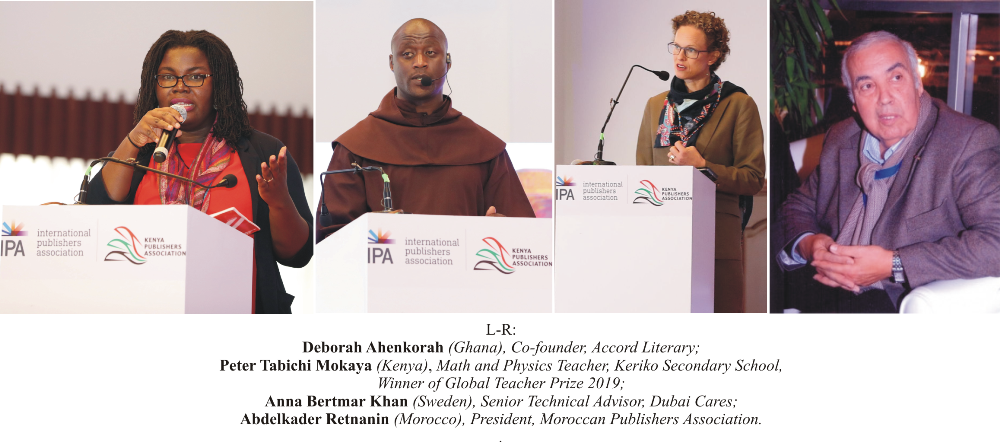
FOREIGN
INTEREST AND JUSTIFICATIONS FOR HOPE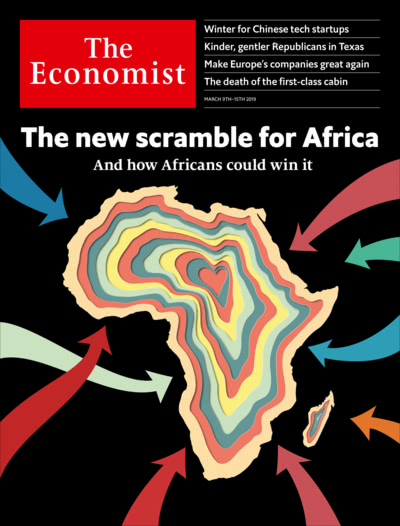
Doubtless a major justification for the commitment of the IPA is hard-headed economics. So it should be: economics is key and African is an emerging market. A lucrative one. Emblazoned across the cover of the March 2019 edition of The Economist magazine are these words: The New Scramble for Africa. It is the title of the month’s main article which engages with what the writer terms the ‘unprecedented extent of foreign engagement’ with our preyed-on and maligned continent. Read it here.
https://www.economist.com/leaders/2019/03/07/the-new-scramble-for-africa
It is a fascinating, readable look at the promise of Africa today. For those who may not click the link, let me quote the introduction:
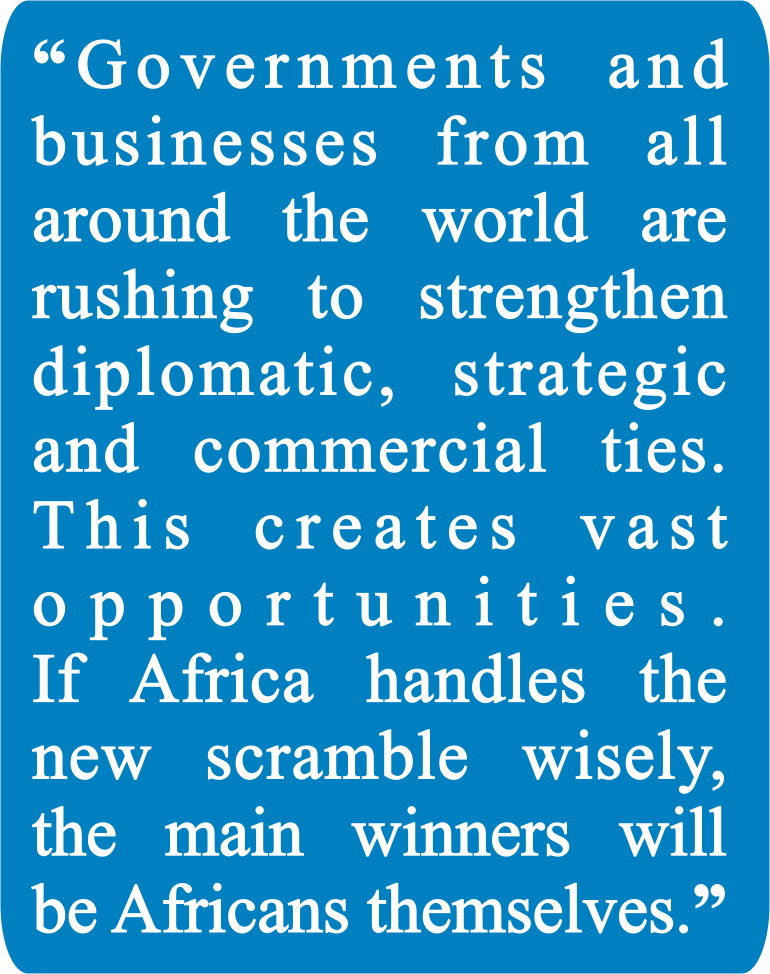
“The first great surge of foreign interest in Africa, dubbed the “scrambleâ€, was when 19th-century European colonists carved up the continent and seized Africans’ land. The second was during the cold war, when East and West vied for the allegiance of newly independent African states; the Soviet Union backed Marxist tyrants while America propped up despots who claimed to believe in capitalism.
A third surge, now under way, is more benign. Outsiders have noticed that the continent is important and becoming more so, not least because of its growing share of the global population (by 2025 the UN predicts that there will be more Africans than Chinese people). Governments and businesses from all around the world are rushing to strengthen diplomatic, strategic and commercial ties. This creates vast opportunities. If Africa handles the new scramble wisely, the main winners will be Africans themselves.â€
That ‘third surge’ represents some of the ideas and much of the sentiment underpinning the IPA African Seminar Series and my own take on the Nairobi event. And if there is some cynicism and predation in the interest of a few world powers in the action about our continent, that does not give the lie to the sincerity of others. I believed Hugo Setzer, President of the IPA, when he evoked the African philosophy of Ubuntu during his Opening Address. To the leaders of 40 African publishers associations and other stakeholders assembled in the Hall of Africa, Môvenpick Hotel, President Setzer presented Ubuntu, undergirded by the principle of a shared humanity on a shared planet. He quoted Archbishop Desmond Tutu: “You can’t exist as a human being in isolation. You are connected. What you do affects the whole world.â€
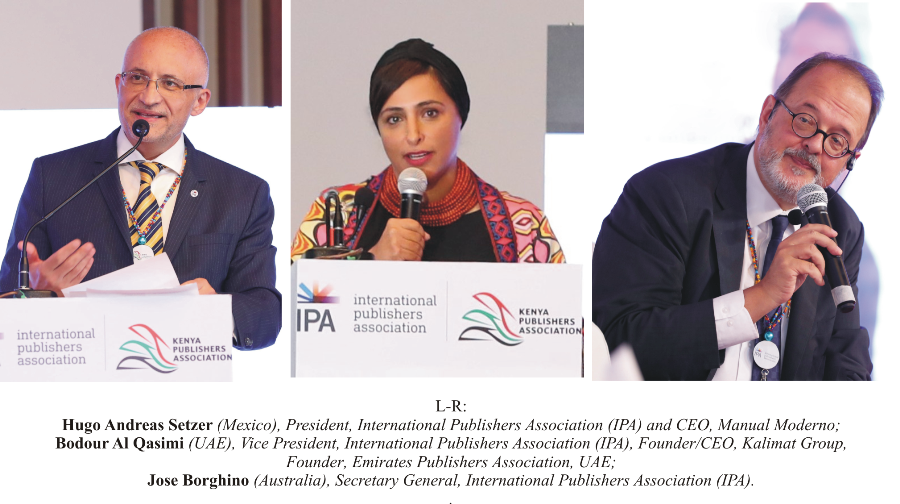
Both Hugo Setzer and host Lawrence Njagi, President of the Kenya Publishers Association, who spoke before him, praised the passion of the first Arab woman in the history of IPA’s leadership, Vice-President Bodour Al Qasimi. A champion of Arab and African publishing, her own speech, delivered on the second day of conference, decried negative ‘stereotyping’ and pointed out that both our people groups navigate a world with low expectations of us. As Africa seeks to realise her potentials, Al Qasimi re-affirmed the IPA’s support, promising book industry practitioners: You won’t walk this road alone. With generous material contributions, EMAAR, Emirates Airlines, Sharjah Publishing City testified to the commitment of the Arab world to see African publishing grow. Serving as exhibition sponsors were Sharjah World Book Capital 2019, [the UNESCO originated year long program of book industry events] which the IPA Vice-President chairs, and the Emirates Publishers Association which she founded in 2009. Logos of UAE behemoths festooned the walls of the entrance to the Hall of Africa.
AFRICAN LITERARY CULTURE
Africa Rising? Faced with our litany of woes? Self-serving
leaders, institutionalised corruption, lack of political will to support
sustainable growth in our industries – see how neglectful governments have been
of publishing - and the corollary- unabated migration overseas. Can we blame the
sceptics rolling their eyes in irritation at the mention of an African
renaissance? No, we cannot, but corruption
shouldn’t blind them to positive expressions of life on the continent. 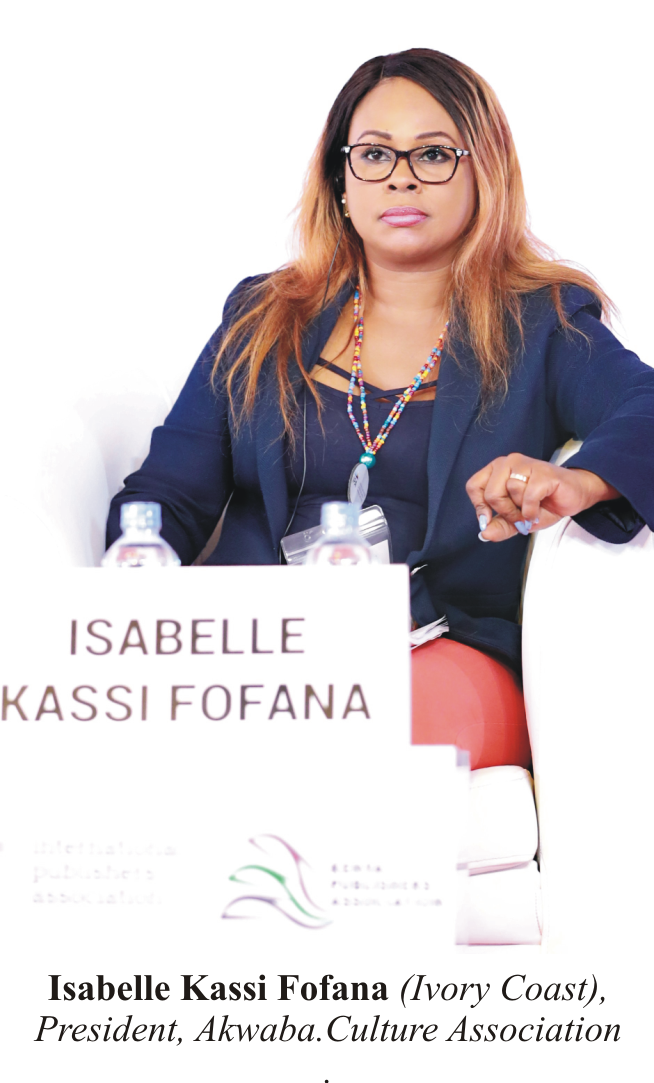
What about the exploding interest in African literary culture and impressive developments within the field? It did not fizzle out as predicted by the prophets of doom. When Chimamanda Ngozi Adichie’s burst onto the world stage in 2003 with her novel, Purple Hibiscus, it whet the world’s appetite for African voices and today, thanks to the efforts of a new generation of publishers such as Modjaji Books (South Africa); Akoo Books - audio (Ghana); Bakwa Books (Cameroon); First Veritas (Educational Publishing , Nigeria); Huza Press (Rwanda); Parresia (Nigeria); Farafina (Nigeria); Bookcraft (Nigeria); Cassava Republic Press (Nigeria); Kwani? (Kenya), Amalion (Senegal); uHlanga Press (South Africa), literary artists domiciled at home are able to stand alongside their peers living abroad to gain a visibility at home and abroad previously unknown. The world wants more: the world at home and the world abroad. Go online and search for Africa’s literary sons and daughters: they adorn shortlists of prestigious awards. Go to Brittle Paper, Afridiaspora, The Johannesburg Review, jamesmurua.com. Also search WAWA Book Review which is delivering high quality review services, training the next generation of book reviewers and earlier in 2019, hosted a workshop for emerging reviewers and a panel discussion in Lagos about African Literary Culture. The speakers were high level: Indra Wussow of Days Wunderhorn, Otieno Owino of Kwani?, and the founder of the blog, Arab Lit, and translator, Marcia Lynx Qualey. Go to any established literary journal/blog they will show you home-grown prizes increasingly coveted; no longer poor relations of awards created and domiciled overseas. Awards worthy of note: the newly revived (2019) 9mobile Prize for Literature (formerly the Etisalat Prize) sponsored by the eponymous telecoms firm; the Wole Soyinka Prize for Literature in Africa founded by the Lumina Foundation; The $100,000 NLNG Nigeria Prize for Literature; and lately, Senegal Amalion Publishing and the Abdou Moumouni University in Niamey, Niger, have jointly inaugurated the Sarraounia Prize for Young Adult Fiction in French, English or Hausa. And though the Orange Book Prize in Africa which took off in 2019 is not an African initiative, it was conceived to recognise [for now] francophone literary talent and to help strengthen publishing on the continent. Isabelle Kassi Fofana’s presence at the seminar is a testimony to growing international recognition of local literary prizes. From the Côte D’Ivoire, Fofana is the president of the Akwaba Culture Association responsible for the glittering Prix Ivoire.

I exchanged business cards with Angela Wachuka. Executive Director of leading literary organisation, Kwani Trust, she is as significant to literature in Kenya as Kassi Fofana is to literature in the Ivory Coast. Wachuka is also co-founder of Kenya’s Book Bunk, an organisation seeking to restore Nairobi’s public libraries and to decolonise them with carefully curated book acquisitions and event programming, starting with the McMillan Memorial Libraries established by the colonial government Kenya to serve the white population. To me reading books should be as normal as breathing; to cities, libraries should be oxygen to their hearts. Curious about the Book Bunk project, I visited their website. The vision statement written in large print across the Home page, is arresting:
“We imagine that public libraries can be steered to become more than just repositories, acting as sites of knowledge production, shared experiences, cultural leadership and information exchange. We see them as sites of heritage, public art and memoryâ€
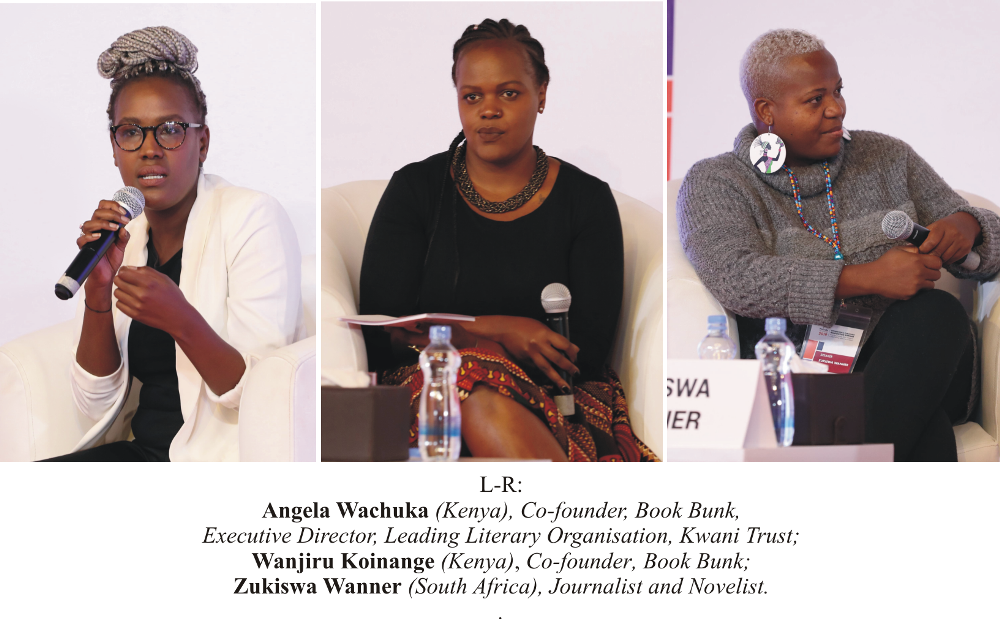
The Book Bunk partners, Angela Wachuka and Wanjiru Koinange, were two literature advocates in a glittering caucus that included Peter Kimani, author of Dance of the Jakaranda, a New York Times Notable Book; Petina Gappah from Zimbabwe, author of Elegy for Easterly which won a Guardian First Book Award; South African Zukiswa Wanner, Nairobi resident, prolific novelist and now, Paivapo publisher. Political cartoonist Gado, winner of the prestigious Prince Claus Award in 2007 under the theme of Culture & Conflict spoke in a discussion I was sorry to miss: The Growing Threat of Self-Censorship moderated by IPA Freedom to Publish Chairman, Kristenn Einarsson. Gill Moodie whom I interviewed at the seminar, spoke on this panel. http://bordersliteratureonline.net/globaldetail/Gill-Moodie
Kimani whose novel, feted overseas, was rejected by publishers at home, would not back down about African publishers lacking imagination and faith in the power of African content to sell itself. Zukiswa Wanner shared a moving memory of the launch of children’s book Story, Story, Story Come in South Africa. A first for her publishing house, Paivapo, and edited by Maimouna Jallow, the book was launched in a South African township hall overflowing with people with little to no money but hungry for children’s stories hidden in books.
STRENGTHENING THE PUBLISHING ECO-SYSTEM
Thabiso Mahlape,
Publisher, Blackbird Books and Abdulrahman ‘Abu Amirah’ Ndegwa, founder of the
unapologetically Swahili Hekaya Initiative were a part of that glittering
caucus smashing the myth that ‘Black
people don’t read’, articulating ideas for Creating the Readers of the
Future, an eco-system panel
moderated by President of the Kenya Publishers Association, Lawrence Kibaara Njagi.
Another, Developing Africa’s Next
Generation of Publishers, Writers and Artists was moderated by Maimouna
Jallow.
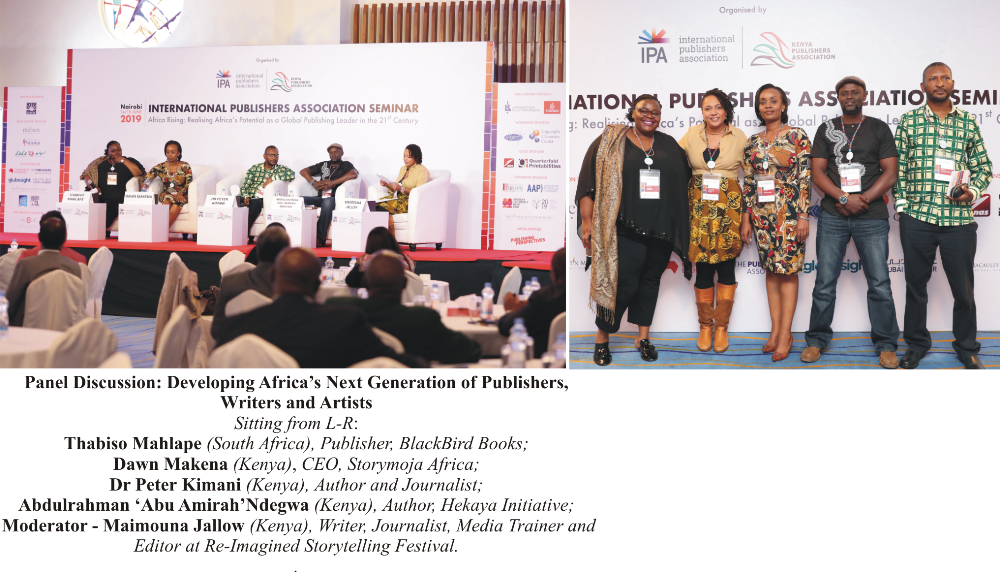
“All decisions and practices should be anchored in and guided by a national policy framework, not ad hoc or ever-changing rules depending on who’s in charge at government or technical level.
1. Creativity gives rise to innovation in writing and presenting information and lessons, whether in trade, educational, academic or other types of books. We need to encourage more people to write different genres of books and to move away from focusing so much attention and energy on textbooks.
2. Collaboration with local and international partners provides added value. It enables content producers and writers to keep abreast with international trends, as with digital reading materials, for example. Additionally, collaboration facilitates broader exposure for author and publisher as well as better promotion and higher potential sales and access to a work.
3. Competition encourages quality. This is particularly true for upholding standards, selection, procurement, payment. Stifling competition breeds corruption. In the case of textbooks, when government agencies take over writing, production, and distribution, that means 80 percent potential revenue going to those agencies. That is revenue that could be in private business and which could be further invested in developing writers and increasing availability of books. Government should not be referee/regulator and player competing with less-resourced private publishers.
4. Contracts should include who holds and or owns copyright. Implications for reprints, derivatives such as film production rights, and non-payment of royalties all need to be factored into the language of contracts. Contracts should not be limited to authors; the work of illustrators should also be covered by contracts. This is particularly important for children’s books, where illustrations often convey more expression than words.
5. Costs. What are the drivers? Are they from customs duties, taxes, distribution (road transport, shipping, postage)? How can these be brought down within a country or across borders? For textbooks, the timeframe for a book provision program—from availability of curriculum to delivery of books to schools—should be realistic to allow for optimum content development, production quality and delivery to end-users.
I remember his caution about costs at the Nairobi seminar. His exact words: “If costs are cut, it will reduce quality... And what about distribution costs?â€
I remember his appeal to his colleagues to be far more realistic about time frames: “We need time to write; time to publish; time to get the books into the schools.â€
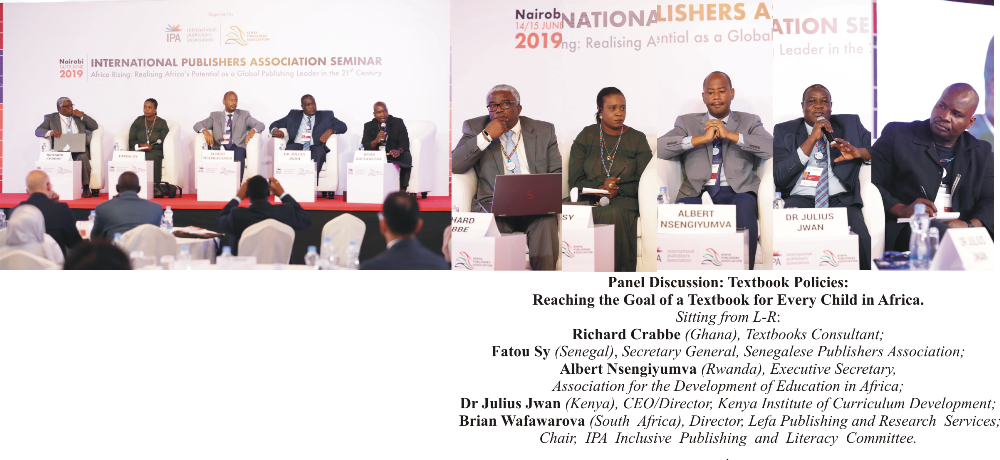
Enitan Solarin, owner of Wordsmith, a Lagos based bookshop, recently told me that her greatest challenge as a bookseller in Lagos is acquiring books by African authors. The incoherence of the book chain does nothing to help this problem and she has invited me by means of this essay to call for greater cohesion so that there can be effective information transmission up and down the chain. I wish she had been present in Nairobi to share with delegates her recommendation that: “There should be a central clearing house where information on local publishers and rights owners catalogues can be accessed for information.â€
An objective of my essay is to reflect the effort
made by seminar organisers to represent the wider book-chain as panellists and
as guests. Alongside publishers were journalists and bloggers [James Murua of
jamesmurua.com, (Kenya) Porter Anderson of Publishing Perspectives (USA)] Edward
Nawotka of Publishers Weekly (USA). I have already mentioned artists, Gado
Mwampembwa, political cartoonist (Tanzania) and Maimouna Jallow, dramatist
(Kenya)] who, as moderator of the Publishers,
Writers, and Artists panel, celebrated the inclusion of artists in the
discussion title, commending the IPA’s recognition of the wider publishing
eco-system. But why were there no booksellers on panels?
I was surprised and concerned given the gaps in the book retail sector. Unavailability of titles by African authors leads to poor to no representation in bookshops. Lack of education about the economics of book retail leads to poor credit records. Attributed to far too many book sellers, the problem was brought to light in a wide-ranging study about the Nigerian book industry published by Guardian newspaper on 2nd April 2017. A title with teeth, designed to raise the alarm: Book Industry Reels In Debt as Publishers, Booksellers Bicker.
The absence of African Books Collective was a surprise too. Now using the print-on-demand model, ABC is quite possibly the world’s largest marketing and distribution institution for books published on the African continent. When I shared my review with Justin Cox, the CEO of the organisation, this is what he said. I quote him here, with permission:

WE NEED
PUBLISHING EDUCATION & DATA COLLECTION SAVVY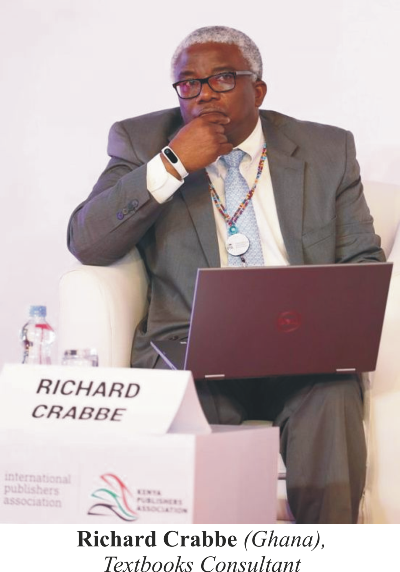
Despite a colonial and post-colonial history spanning decades, publishing in Africa is still in its infancy. Step by step technical knowledge is needed about how to create viable businesses with the necessary systems in place. To get within spitting distance of global leadership, the industry must professionalise. With his 5Cs publishing consultant, Richard Crabbe, has put us on a good conceptual footing: Creativity; Collaboration; Competition; Contracts; Costs.
The IPA is responding to the call for professionalism. To the urgency for data collection systems, organisers set up a panel at the Nairobi seminar, moderated by APNET Chairman, (MD, University Press Plc), Samuel Kolawole: Data Innovation: Developing Data and Statistical Capabilities to Support the Publishing and Creative Industries. Speaking on the panel, Isabelle Kassi Fofana, suggested publishers’ reluctance to provide data may be rooted in embarrassment: fear of being shown-up as lacking know-how and credible results; a fear that undermines wide acceptance amongst publishers that it is reliable data not anecdotal information that will attract government interest and investment in the industry.
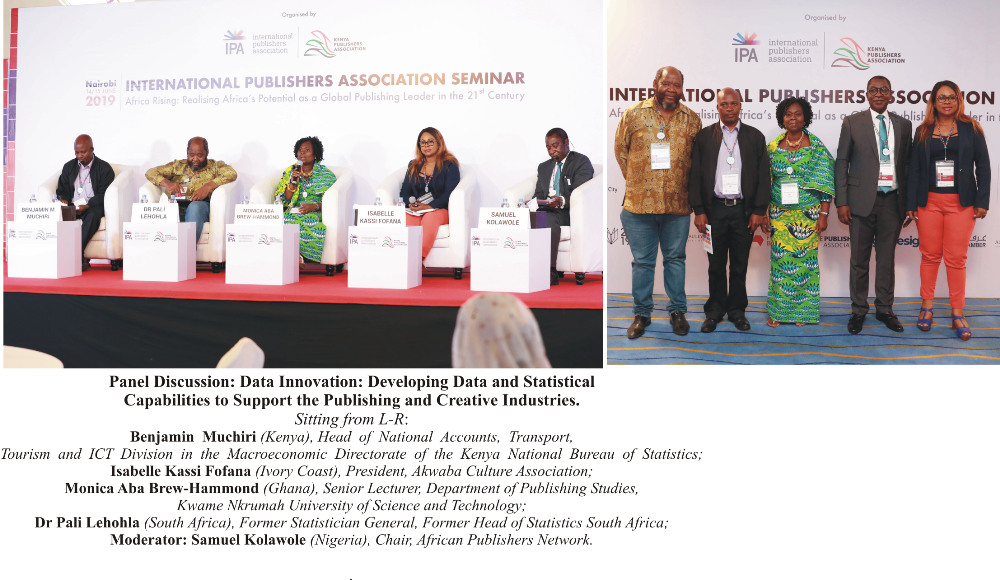
A partnership with Insight Wells Research has
been forged in a pilot program titled: Pulse
of the African Publishing Industry Survey . The pilot will inform
policy, advocacy and planning for future seminars. Of critical importance was the invitation
extended to André Breedt of Nielsen Book Research International to present the
benefits of using Book Scan, Nielsen’s globally recognised software for research
and measurement in book retail. Successfully taken up by South Africa, Book
Scan features in my interview with Gill Moodie of NB Publishers based
in South Africa. Nielsen’s software is being reviewed by the Nigerian
Publishers Association for adoption in our own book trade. It was music to my
ears when Breedt concluded his Power point presentation with an invitation to
publishers interested in BookScan to see him at anytime
during the meeting (and presumably, after). With 40 publishers associations represented
by their leadership in that hall, I saw a golden opportunity to leapfrog into
the future. Surely this is the solution to the industry’s poverty of data and
analytics? Surely now with reliable metrics, publishers can get the data needed
to attract investors; to begin to move
the industry forward- starting this year?
I have read Transformation Goal 4 of the Lagos
Action Plan ‘Leveraging Data for Advocacy and Digital Transformation’. It is written with uplifting simplicity. What
are Africa’s publishers waiting for? South Africa has already done it. Take a
leaf from South Africa’s book.


WE NEED PUBLISHING EDUCATION & COPYRIGHT SAVVY
On August 23rd 2019 The Cable reported
that there is a war on. The combatants: JUMIA, online retailer with
headquarters here in Lagos, Nigeria, and Bookcraft Africa, Ibadan based
publisher of Nobel Laureate, Wole Soyinka, luminaries Biodun Jeyifo, Femi
Osofisan, JP Clark, Kole Omotoso, Yewande Omotoso and others. JUMIA is accused
of the sale of pirated copies of journalist Olusegun Adeniyi’s book, From
Frying Pan to Fire. The
publishers’ solicitors have demanded the book be taken
down from the portal and a compensation to the client of N10 million (approx
$28,000). Bookcraft’s lawyers are still waiting to hear from JUMIA.
Piracy causes the book industry staggering financial
losses. Legal costs for fighting it are steep. Speaking on a panel in
Nairobi, José Borghino, IPA Secretary-General, lambasted the ‘irresponsible
behaviour’ of tech behemoths GAFA (Google, Apple, Facebook and Amazon) and
anti-copyright zealots, describing piracy as ‘The dark side of publishing’.
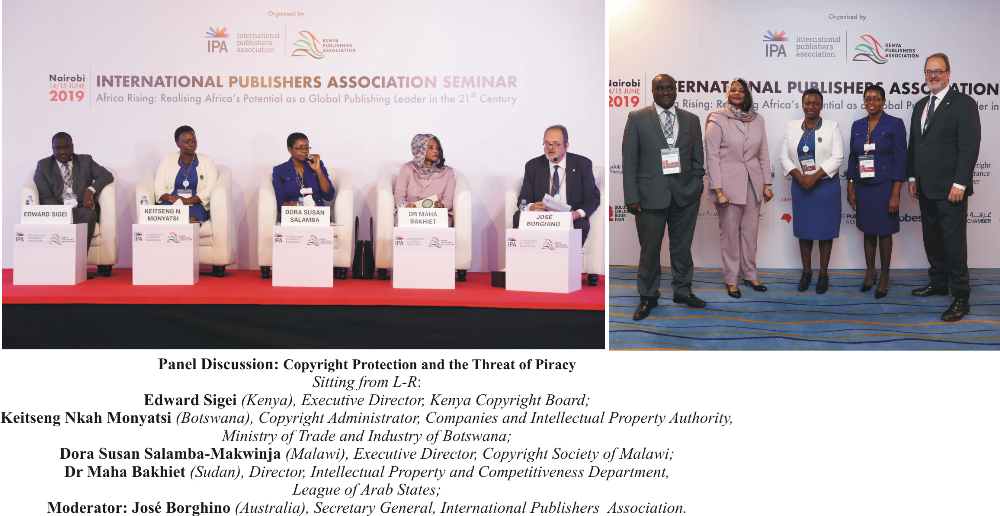
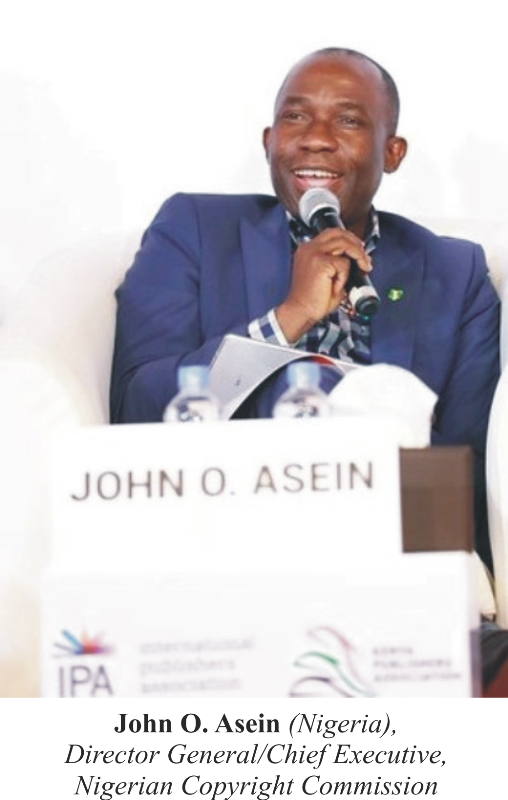
As mentioned earlier, John Asein, Director-General of Nigerian Copyright Committee, was present at the seminar. NCC has a zero tolerance policy to piracy, he said. According to one study, pirated books represent up to 70% of books in circulation in the Nigerian school system. If this is true, the situation is dire and begs questions about how this zero tolerance policy works and what it looks like. It also begs questions about knowledge: how many consumers understand the harm caused by piracy to the publishing industry? And how many publishers understand the intricacies of copyright, of buying, selling rights and licensing?
To begin to address yawning knowledge gaps, the IPA organised a Fireside Chat about copyright in the evening of 14th June and the next day, a Copyright Workshop which saw UK’s Michael Healey of Copyright Clearance Centre brimming with optimism. He endorsed the Lagos Action Plan which he said was paving the way with practical steps ‘to create copyright ecosystems that can support Africa’s emergence as a global publishing leader and accommodate its rapidly growing digital economyâ€. [From Healey’s entry in the Lagos Action Plan booklet, I learned to my astonishment that Africa boasts an internet growth exceeding 10,000% - the highest growth rate in the world.] Second, Healey introduced key opportunities resident in copyright. I noted his introduction of the work of the International Federation of Reproduction Rights Organisations in Africa. IFRRO’s purpose is to facilitate, on an international basis, the collective management of reproduction and other rights relevant to copyrighted works through the co-operation of national Reproduction Rights Organisations (RROs). [For information about Reproduction Rights Organisations and opportunities facilitated by RROs, visit Reproduction Rights Organisations of Nigeria: repronig.ng and the online library at wiley.com https://onlinelibrary.wiley.com/doi/pdf/10.1087/09531510050162101]
Serving as Copyright Workshop moderator, Kiarie Kamau, CEO East African Educational Publishers, commended the Englishman for shifting the discussion paradigm from a negative one about preventing piracy to one of verifiable hope in copyright. Marisella Ouma of the Central Bank of Kenya, Carole Croella of WIPO and Maxwell Wahome of Longhorn Publishers (Kenya) were the other experts participating in the pilot project established as Transformation Goal 3 of the Lagos Action Plan and designed with a view to ‘Making Africa’s Copyright Framework Fit for the Digital Era’.

THE DIGITAL REVOLUTION AND GOVERNMENT SUPPORT
The Nigerian government was conspicuously absent from the 2018 Lagos IPA Seminar. Of the 200 delegates present, John Asein and Afam Ezekude of the Nigerian Copyright Commission were the only Government reps I saw. A year later, in Nairobi, Lawrence Njagi of the Kenya Publishers Association would praise the Kenyan government for listening, for being a working government, successfully establishing a 1:1 text book-pupil ratio in order to promote strong educational outcomes. The Kenyan government was very much present and vocal about its support for Kenyan publishing. A retired colonel [his name and panel escape me], was a strong advocate for digital helping to meet challenges – capacity, accessibility and reach (particularly rural areas), declining library services etc - faced by the print dominated industry. He pointed out the urgent need for a mix of print and digital resources to accelerate universal education.
StreetLib.com is a digital publishing company with “a network of thousands of publishers, booksellers, authors, editors, publishing operators from all over the world†according to CEO, Giacomo D’Angelo who was invited to present the wonders of block-chain technology. The Italian ended his talk with a declaration: “Digital books will become unstoppableâ€. Words which paved the way for Digital Transformation and Disruption in African Publishing, moderated by Ochekechukwu Ofili, dynamic founder of Okada Books. Tall, supremely confident in his trademark yellow Okada jacket, shining exponent of the power of mobile telephony to leverage an exploding population of youth wired to consume content from screens. Importantly these youth are proving proactive in innovating solutions to realise their own creativity. The panel featured wünderkinder Chidi and Chika Nwaogu, 20-something year old founders of digital publisher for books and music, Publiseer. Lamenting the unavailability as e-pubs of the books they studied at school, the twins encouraged publishers to digitise every single book in their catalogues and argued that this kind of innovation would interest investors in Africa’s publishing potentials.
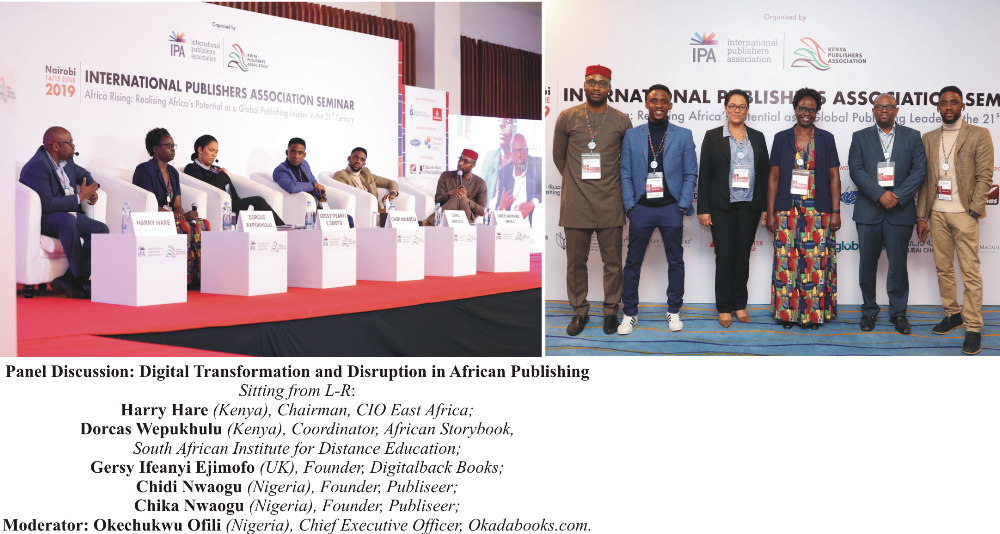
When Gersey Ifeanyi Ejimofo of Digital Back Books, the virtual library platform, encouraged publishers to partner more actively with digital marketers, I nodded in agreement. As a publicist for the sector, I can testify that it is often authors who initiate links between their publishers and my publicity services. This is reversing the order: it is the work of publishers to initiate PR/Media interventions for marketing their books. Listening to her - to all of them - speak about how they birthed their digital solutions, I became convinced that if African publishing is to rise, it will be on backs of the digital dreamers.
But to my techno-illiterate ears, what they said was at times hard to follow and after the conference, I asked Giacomo D’Angelo, to explain block chain technology and its potentials as galvaniser of the African publishing economy. He responded with enthusiasm, providing links to the script and slides of his presentation, and talking with great hope about GitHub, an American service platform which had encountered trading difficulties. He explained that the firm “was forced (who knows) to close its doors to Iranian developers, leaving them outside the digital economy in their specific industryâ€. He told me that the GitHub case study presents the kind of difficulties that can be solved with blockchain in a global book industry dependent on traditional financial and institutional systems.
An Amazon Affiliate, I perked up when he pointed out that the Amazon is “both the seller and the controller†and asked me whether or not I “see the problem here?†He was talking about transparency in the digital arena, citing block chain as the way out of that impasse too:
“Block chain network (in the form of a public ledger) can provide an open and verifiable service, a unique and independent source of truth that doesn’t depend on any big company, and that publishers can really trust. Hence, the concept is trust – moving from a big centralized corporation to an open and independent blockchain-powered network.â€
Industry stakeholders who wish to know more about block chain as a solution might be wise to explore these links:
https://medium.com/streetlib/unstoppable-books-f58312d0d14d
https://techcrunch.com/2019/07/29/github-ban-sanctioned-countries/
I know far too little about technology but I do know that the African book industry must leverage the digital revolution to accelerate its growth. And the gain for government? Is it so difficult to see that a strong publishing sector [one in which Richard Crabbe’s 5Cs are enthroned], holds the keys to the knowledge economy and an African nation’s freedom from dependence on and exploitation by hegemonic systems constructed by the world’s vested interests.

MONEY MONEY MONEY
The IPA has established the African Publishing Innovation Challenge Fund to encourage projects that solve our industry’s problems. Fundraising strategies are being carried out with leading Gulf education charity, Dubai Cares, paving the way for more donations with a start-up gift of $800,000 to be spent over the next four years. The funds will support implementation of projects envisaged in the Lagos Action Plan which since Nairobi has been renamed the IPA Africa Action Plan. My interview with Gbadega Adedapo, President of the Nigerian Publishers Association, focuses on the Action Plan’s objectives, outcomes and partnerships, and will be published on Borders:http://bordersliteratureonline.net/globaldetail/Gbadega-Adedapo.
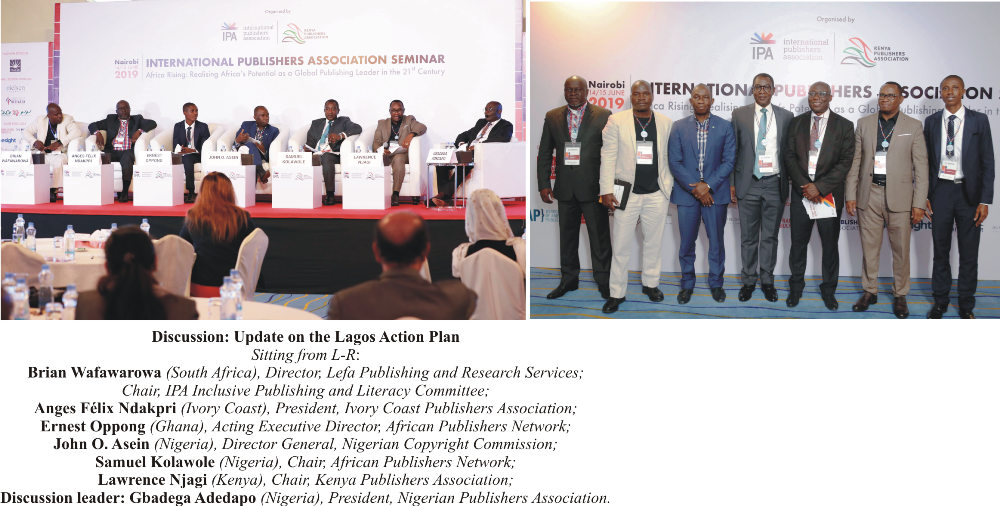
With the winds of fortune blowing in our direction, the IPA’s focus on Africa could not have come at a better time. According to the Overseas Development Institute [odi.org], 5 of the top 10 fastest growing economies in 2018 were African: Djibouti, Rwanda, Ethiopia, Senegal and Côte D’Ivoire. And on March 30th 2019 the African Continental Free Trade Agreement made history by bringing into force the world’s largest free trade zone. According to the African Union website this represents:
“A milestone in Africa’s resolute use of the lever of continental integration to deliver prosperity to her people in line with Agenda 2063: The Africa We Want.â€
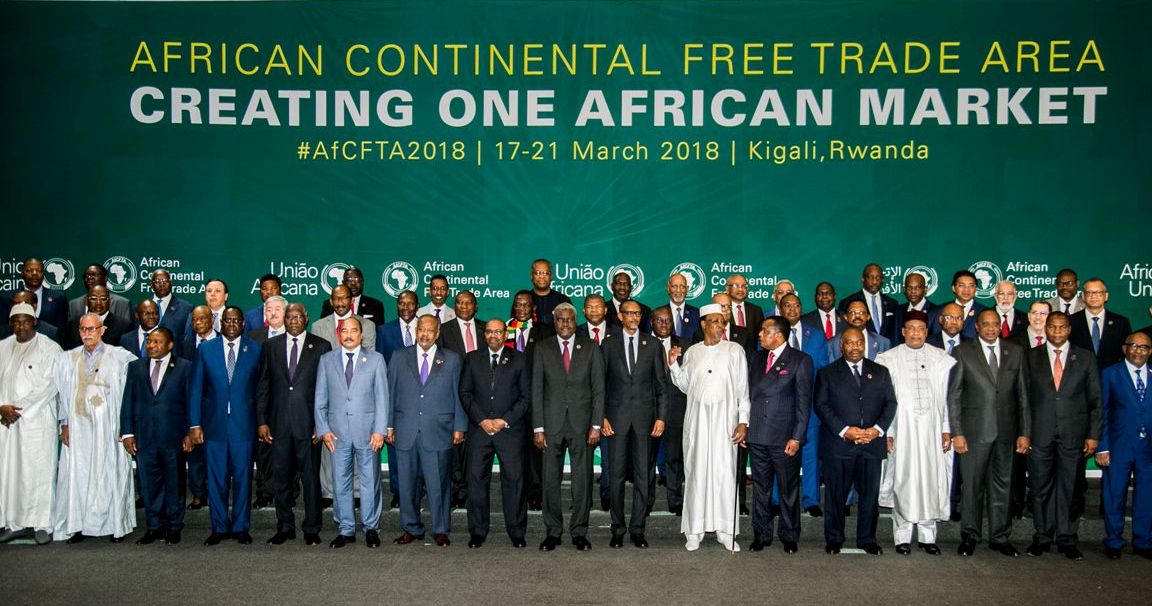
It is a grand vision of the AU instituting a single customs union for Africa, aiming:
“...to increase the low intra-African trade, currently around 17%, lower than the 59% observed in Asia, by removing tariff and other barriers on trade on goods and services... It also wants, in the second phase of the negotiations, to introduce provisions to increase intra-African investment, the protection of property rights and to eliminate unfair competition practices. By doing this, African countries aim to create the conditions to diversify exports away from the current unstable commodities.†[odi.org]
AfCFTA might not by itself reduce high transport and logistics barriers, and production constraints affecting trade on the continent, but without a doubt what it will do is promote and help sustain a thriving intra-African book trade. The writer of The Economist magazine feature, The New Scramble for Africa (March 7th 2019), sees real hope coming our way via the unity represented in AfCFTA:
“African governments could strike better deals if they showed more unity. No one expects a heterogeneous continent that includes both anarchic battle zones and prosperous democracies to be as integrated as Europe. But it can surely do better than letting China negotiate with each country individually, behind closed doors. The power imbalance between, say, China and Uganda, is huge. It could be reduced somewhat with a free-trade area or if African regional blocs clubbed together. After all, the benefits of infrastructure projects spill across borders.â€
AfCFTA - surely a compelling case for a serious consideration of Africa’s economics and her rise to global power?

LANGUAGE AS THE SOUL OF AFRICA AND PASSING THE BATON
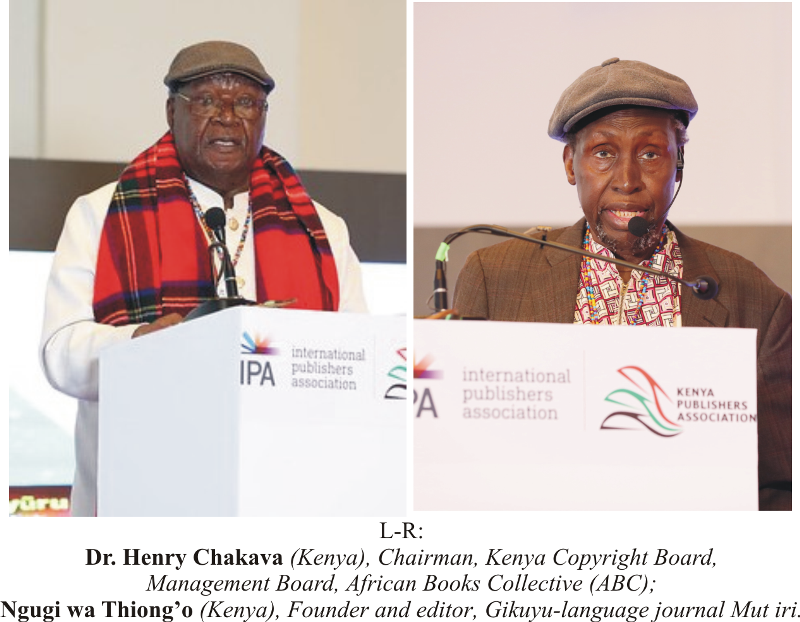
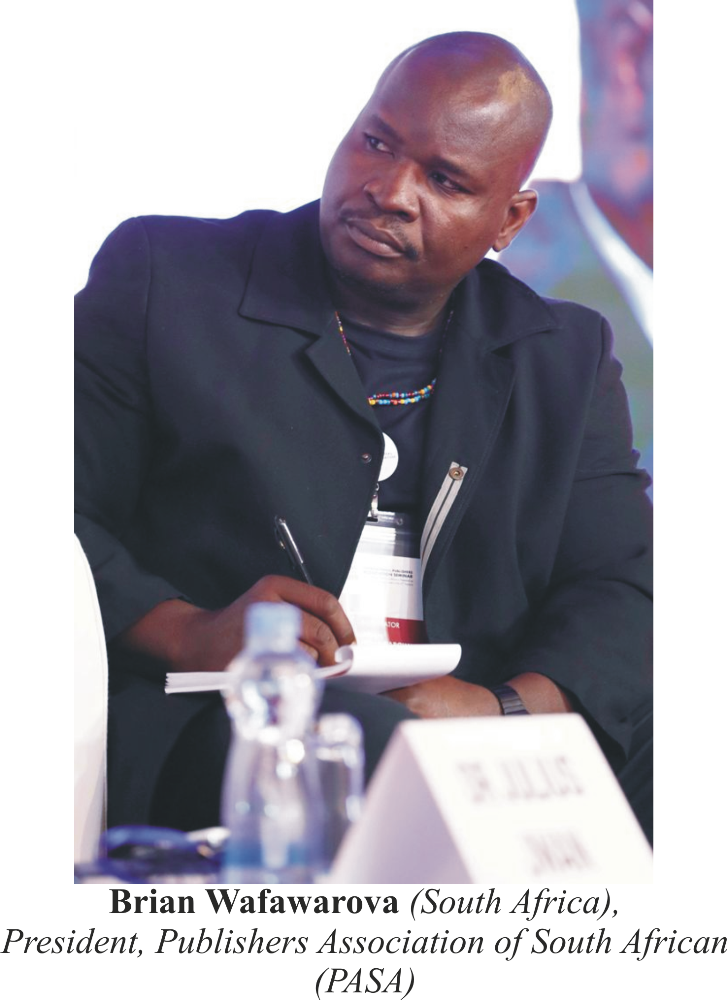
Now as I near the end of this essay, my mind’s eye scans the great Hall of Africa. I see Chidi and Chika Nwaogu, trailblazing twins in their twenties; Okechukwu Ofili of Okada Books; Moses Kilolo from the celebrated Jalada Collective. I’m looking at faces and over the heads of about 350 industry stakeholders and my eyes finally settle on the octogenarian heads of Henry Chakava and Ngugi wa Thiong’o. The feeling of blessing is still with me. Brian Wafawarova, former President of the South Africa Publishers Association and Chair, IPA Inclusive Publishing and Literacy Committee, has written touchingly about what the intergenerational mix meant to him; how it enriched the Nairobi seminar and about his overall views about the value to African publishing of Lagos, Nairobi, Marrakech in 2020 and future IPA Africa gatherings. You can find his commentary on Borders:
http://bordersliteratureonline.net/africanpublishing/Brian-Wafawarova-Commentary

AFRICA RISING
I see Ngugi wa Thiongo’o. A dreadlocked young man has suddenly appeared - from nowhere. He joins him on stage. There they both stand –it is hilarious- making a raucous musical hall case for smashing the hierarchy of languages which prioritises colonial languages and insults our own. There they stand, bellowing the chorus Glory Glory Hallelujah and its parody, Gory Gory Hallelujah.
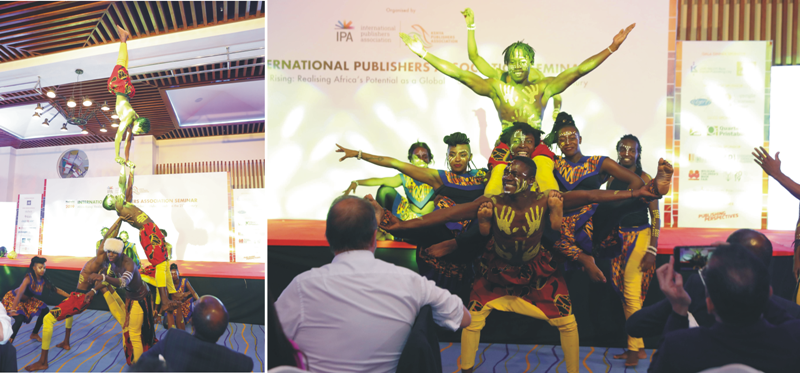
Now it is the much younger Moses Kilolo that has been invited on stage by the old man. Kilolo has a project to showcase, Ngugi tells us. The Upright Revolution, scrolling on the screen has made world history. It has been translated into 86 languages, 54 of which are African. Ngugi’s short story is unrivalled. A translation project without peer. Licensing rights will continue to be procured for prose translations, for dramatic interpretations and music and visual art adaptations of The Upright Revolution.
The
younger generations are blazing a trail for Africa’s rise as a cultural force,
with languages at the forefront of the crusade. Soon our languages will take
their place in the network of lingua franca alongside colonial languages, and yes,
Ngugi wa Thiong’o did say alongside colonial
languages, not, instead of.
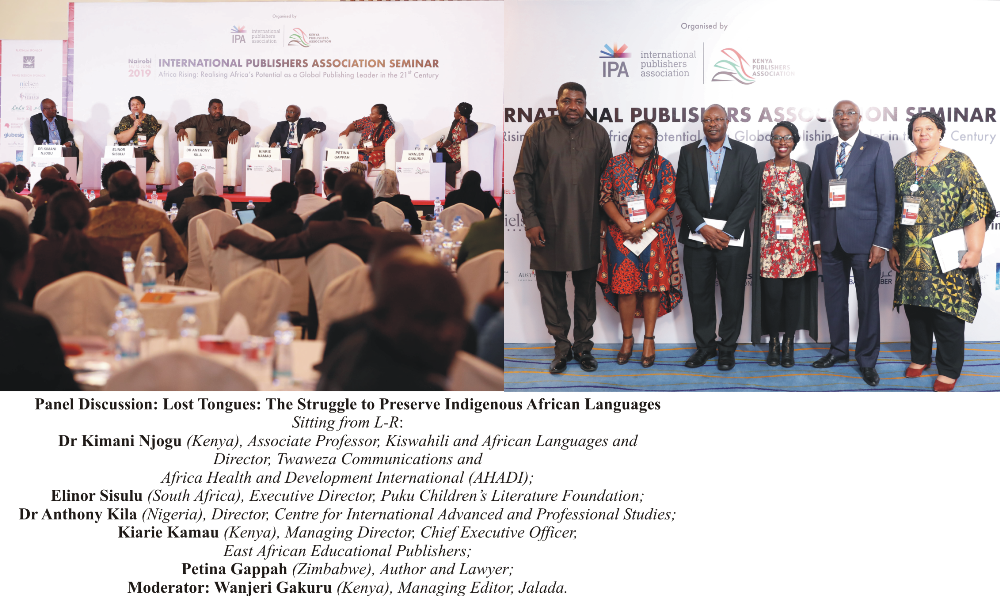
What passion in the voices of the younger generation of evangelicals sharing tales of their struggles to preserve lost and at risk tongues. I have just presented Moses Kilolo. Other - older- speakers were Dr. Kimani Njogu, Kenyan scholar [Kiswahili and African Languages]; Zimbabwean author Petina Gappah; Kiarie Kamau of East African Educational Publishers. Dr. Anthony Kila is the Director of the Centre for International Advanced and Professional Studies in Nigeria and a South African whose company I enjoyed at the seminar was Elinor Sisulu, NOMA Award winner in 2004 for her biography of Walter and Albertina Sisulu, revered fighters in the struggle against Apartheid. Her parents-in-law. Sisulu is founder of the PUKU Foundation which addresses children’s literacy in South Africa and ensures the availability of resources for children in all South African languages.

Moving
forward with work that embodies the spirit and objectives of the 2000 Asmara
Declaration on African Languages and Literatures, Moses Kilolo, Elinor
Sisulu and their comrades in the struggle, are standing on the shoulders of
giants. On June 14th 2019, in Nairobi, a son of Kenyan soil, an aged
giant of the struggle, spoke beauty, pride and joy into our hearts with his rejection
of Africa rising on English (read colonial) wings.

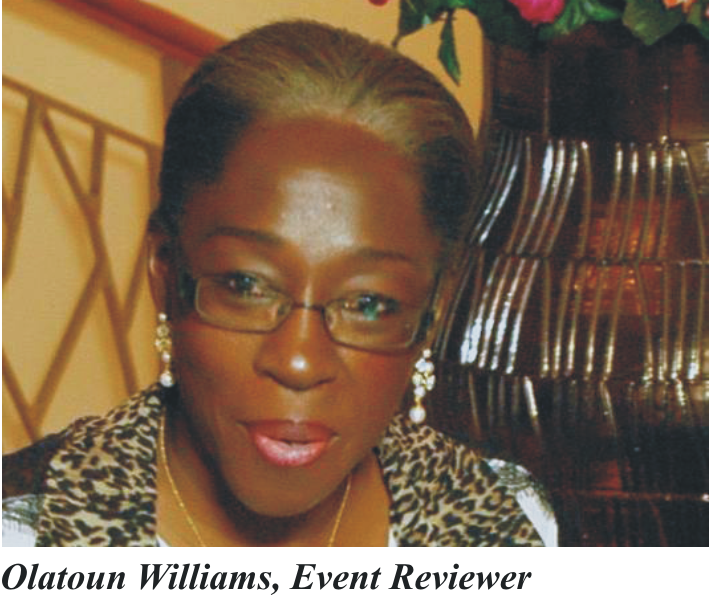


I am drawn to people of mixed-cultural descent and of mixed-race heritage. I'm also drawn to ...
David Aguilar, born in Andorra, is an inspiring figure known for his resilience and crea ...